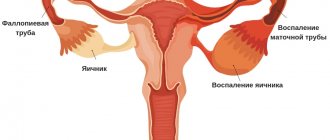Just a few weeks ago, you could celebrate a positive pregnancy test, and even if you hadn't seen your baby yet, you still knew exactly what was growing inside you. Most likely, you even imagined yourself as a mother, but one sudden incident - the loss of a pregnancy - changed the whole situation. You may experience a range of different emotions: sadness, shock, grief, resentment, refusing to eat or sleep, or even not accepting reality. In general, this reaction is completely normal, but it is still worth learning a few things that will help you recover faster after a miscarriage.
What to do if you have a miscarriage
A miscarriage is the process when an embryo leaves the uterus before it can survive on its own. The main symptoms of this event are heavy bleeding and sharp pain in the abdomen and back. Depending on how many weeks your pregnancy has lasted, this condition may persist for several days, and in this case you should definitely be under the supervision of a doctor.
By the time you realize that you have had a miscarriage, the process can no longer be stopped. Miscarriage can be prevented if you regularly undergo ultrasound examinations and donate blood to check the level of hCG and Rh compatibility.
Once the doctor confirms the miscarriage, he will make recommendations for further physical treatment. For your menstrual cycle to resume, your uterus must be completely cleansed. Sometimes this happens naturally, and the fetal tissue comes out on its own, sometimes medication or surgery may be prescribed. Your doctor may also recommend not inserting anything into your vagina for two weeks—having sex or using tampons—to avoid infection. A few weeks after a miscarriage, you should definitely undergo an additional examination to understand when you can become pregnant.
What to do after a miscarriage - how to restore your physical and moral condition
A miscarriage is the spontaneous interruption of embryo development in the early stages of pregnancy. Loss of pregnancy can occur in any trimester. In the early stages, the fetus dies; in the last weeks there is a chance to save the baby. If a girl has a miscarriage, then after it the body should be restored so that complications do not arise.
Possible complications after a miscarriage
Any type of termination of pregnancy leads to serious consequences. Therefore, girls are not recommended to have abortions at an early age. During pregnancy, a woman's body undergoes restructuring. Physical changes and hormonal changes occur in it.
After the development of the fetus is interrupted, it has to change again and adapt to the normal regime. Hormonal imbalances impair the functioning of all organs, which can lead to serious pathologies.
In addition, the following complications may occur due to a miscarriage:
- Isthmic - ecclesiastical insufficiency. Pathology appears due to severe damage to the cervix. Most often it occurs during the first abortion while carrying the first child. This is due to the fact that the cervix is not elastic enough during the first pregnancy. Therefore, during an abortion, when the canals expand, she is injured. The likelihood of a cyst developing increases.
- Low attachment of the egg. During an artificial abortion (surgical operation), the endometrium, on which the placenta is fixed, is damaged. After scraping, the tissues become thinner and adhesions form on them. It takes quite a long time for the endometrium to recover. Therefore, if the next pregnancy after a miscarriage occurs early, there is a possibility that the embryo will not be able to attach to the walls and the girl will be diagnosed with fetal diligence.
- Rhesus conflict. If a pregnancy is terminated, the risk of Rh conflict increases, provided that the girl has a negative blood type. Due to curettage, the concentration of oxytocin in the female body increases, which causes an acute form of Rh conflict.
- Uterine rupture. If the walls of the uterus are weak and loose due to repeated miscarriages, then the vagina may not withstand such pressure. As a result, during a new pregnancy, the uterus ruptures.
To avoid serious consequences and preserve the body, you need to take care of your health immediately after an interruption. The girl must take care of herself and take all possible measures so that the next pregnancy does not end the same way. The recovery period is quite long, but it is important to complete it fully.
How long does it take to bleed after a spontaneous abortion?
After a miscarriage, a woman begins to bleed (often dark red or brown in color). This is due to the fact that when the fetus is detached, the vessels of the uterus are damaged, which causes internal bleeding. During this period, the risk of infection of the genital and reproductive organs increases. Therefore, the girl must be very careful, using various methods of protection.
If after a miscarriage there is a delay in menstruation and severe chest pain, then the reason for this is the remainder of placenta particles in the womb. This can occur in the 2nd trimester of pregnancy. In this situation, the test performed will show a positive result, since the hCG level does not decrease due to the presence of fetal residues inside. If this complication occurs, surgical cleaning will be required.
How long does it take to bleed? It is impossible to give exact figures for how long the bleeding will last, since the body is female. Everyone needs different time for recovery and healing. According to doctors' reviews, on average, bleeding stops within 7–10 days. If heavy menstruation has not stopped after 2 weeks, then you need to consult a gynecologist. The doctor will prescribe tests, and you may need to undergo an ultrasound. During this period, hCG drops significantly, which can be dangerous to health.
Pathological bleeding is characterized by the following symptoms:
- weakness, fatigue;
- constant feeling of sleepiness even after waking up;
- toxicosis;
- migraine;
- dizziness and fainting;
- prostration.
All these signs with prolonged release of blood particles indicate that pathological processes have arisen in the body that require drug treatment.
Lifestyle after miscarriage
While recovering from a miscarriage, it is important to maintain a healthy lifestyle. During this period, hygiene, nutrition and sex life play an important role. In addition, it is important that the girl can recover both mentally and physically.
Hygiene
After an interruption, it is important to adhere to the following rules regarding female hygiene:
- Water procedures are carried out at least 2 times a day. It is advisable to take a warm shower 2-3 times a day. Taking hot baths and steaming during this period is prohibited, as this may increase bleeding due to vasodilation. It is also not recommended to swim in open reservoirs, the sea and public showers.
- During the first days of sick leave, a woman is allowed only sanitary pads. On days 4–5, you can use tampons. It is necessary to change gaskets 5-6 times a day, regardless of contamination.
- When washing your body and vagina, it is best to use sulfate-free natural cleansers. It is advisable to use baby soap and shower gel. It is not recommended to use deodorants, creams and body lotions/milks, as they can cause irritation in the groin area.
Diet
Often girls complain that their lower abdomen hurts after an abortion. If the doctor does not identify gynecological complications, then the problem is in digestion. Therefore, the girl is recommended to adjust her diet. It will help improve metabolism, launch repair processes in the body, and increase muscle tone.
The girl’s menu should include the following products:
- lean poultry meat;
- fish;
- fresh vegetables and fruits;
- greenery;
- tea, fruit drinks, juices, purified drinking water;
- porridge;
- durum pasta.
Sex life
Since after a premature pregnancy, a woman’s uterus and vagina are injured, the risk of infection increases. You can't have sex. If we talk about how long it takes to have sex again, the gynecologist should warn the spouses that sex is allowed only 1–2 months after a miscarriage. Over time, the walls of the uterus will recover, and you can gradually try to improve your intimate life. But not before the deadline.
Physical rehabilitation
After an abortion, the girl must stay in the hospital for 2-3 days under the supervision of doctors. Restorative procedures will help heal damaged areas and quickly return the ovaries to full function.
The doctor prescribes medication, which includes:
- Prophylactic antibiotics (To reduce the risk of infectious complications).
- Anti-inflammatory antibiotics (Relieve inflammation and acute pain).
- Contraceptives for oral administration (Regulon).
The patient is prescribed drugs to increase progesterone levels (Duphaston) and immunoglobulin to quickly restore the body and minimize the risk of Rh conflict. To restore blood vessels, the drug Borovaya uterus is prescribed.
To eliminate the risk of complications, it is recommended:
- Avoid sex for at least 1 month.
- Do not visit places with high air temperatures (bathhouse, sauna).
- Do not take hot baths (it is also forbidden to steam or stay in warm water for a long time).
- Eliminate alcohol and cigarettes from your life.
- Follow all doctor's recommendations regarding medication and lifestyle.
How to restore moral health
Improving a woman’s psycho-emotional state after losing a child is much more difficult than resuming reproductive work. Depression and nervous breakdowns are possible during the rehabilitation period. It is especially difficult to cope with the loss of a child at 37 weeks of pregnancy, when dramatic changes have already occurred in the body.
To completely restore the girl’s psychological state, you will need:
- support from loved ones;
- psychological assistance from a qualified psychologist;
- sedatives;
- time to pull yourself together and come to terms with your loss.
A spontaneous miscarriage will in any case leave a wound in the soul. But a woman must be able to cope with this and prepare herself for re-fertilization and the birth of a baby.
How to prepare for a new pregnancy
After the body has been completely rehabilitated, the woman can become pregnant again. It is important to understand that ovulation after such a stressful state will occur much less frequently due to injury to the organs. Therefore, sometimes it is not possible to get pregnant for a long time.
Doctors recommend the following to prepare for conceiving a child:
- Protect a woman from stress, tension, nerves and excitement.
- Get rid of bad habits for both future parents.
- How can you take different groups of medications?
- Adjust your diet.
- Visit a gynecologist and get advice on taking vitamins.
- Undergo a full medical examination and determine whether there are any risks for the unborn baby.
If a woman becomes pregnant too quickly after a miscarriage, there is a possibility that it will be difficult to carry the child to term, since the body has not been fully restored.
Watch a video about how a girl coped with depression after a frozen pregnancy:
Conclusion
The loss of a child during pregnancy is a serious trauma for a woman, which causes a lot of harm to the female body. After a spontaneous abortion, the expectant mother needs to properly recover and rehabilitate herself. It is important to approach the treatment methods correctly and do not forget to consult a doctor. A woman should be prepared for the fact that the treatment will not be easy and quite lengthy.
azbukarodov.ru
Prepare for different stages of experience
Many people suffering from loss of any type go through a series of steps on the path to emotional healing. The order in which the first three stages occur may vary, as will the feelings you experience, but knowing this will help you understand that you are not the only one experiencing this pain.
- Shock and denial. You may feel lost and not believe that this happened to you. This defense mechanism is designed to protect the psyche from the trauma of loss.
- Guilt and anger. You may begin to blame yourself for what happened: “if I had been more happy about this pregnancy, the baby would have survived,” “I didn’t get enough rest and didn’t eat well.” You may begin to blame others - the partner who did not build an ideal relationship with you, or even God who allowed this to happen. You can feel resentment and envy towards the women around you who are still happy and pregnant or have already had children.
- Depression and despair. You may feel constantly sad, cry all the time, have problems sleeping and eating, and think that your life has lost meaning.
- Adoption. Eventually you will come to terms with the loss. What’s important: you won’t forget about it, you’ll just be able to accept it and return to normal life.
Short-lived happiness
When my daughter was 3 years old and my son was 1 year old, I became pregnant for the third time. My husband and I did not specifically plan a pregnancy, but we used contraception only on the days of ovulation, so conception, although unlikely, was possible.
I was happy about the upcoming motherhood, although it was very scary. I still remember how difficult it was for me to bear my son: I lay almost all the time, did not lift anything, and in recent months I did not leave the hospital at all.
If in the first two pregnancies I was flying with happiness, choosing what I would need to buy for myself during pregnancy and for the baby in the future, what vitamins to take and much more, then this time I started with panic. I was worried that I had an ectopic pregnancy, and I listened to myself in case it hurt somewhere. Then it began to seem to me that the pregnancy had stopped, and I began to check my basal temperature. It is believed that during pregnancy it stays at just above 37°C, and during pregnancy it drops. The next self-diagnosis was Down syndrome. I read endless stories on forums where, according to tests, there was a possibility of illness, but it turned out that the child was healthy. Was this a premonition? Or, on the contrary, did I provoke a miscarriage with my bad thoughts? I will never know, and I hardly want to.
I didn’t understand at all what was happening to me, but instead of enjoying my situation, I panicked endlessly. This didn’t last long, only about a week, when I couldn’t stand it. It was Friday and, despite the short time, I decided to sign up for an ultrasound . Private clinics are open on Saturdays, but the working hours are shortened. Almost everywhere everything was written out. I found free time only in one small clinic, which I heard about for the first time. However, there was no choice, so my husband and I went.
I was received by a young doctor who was in a precarious state herself. Only with the help of a transvaginal sensor was she able to discern the pregnancy. Then something strange began to happen. She asked if I was bothered by pain in the lower abdomen, in the lower back, how I was feeling. Nothing bothered me, but I immediately began asking why such questions. The doctor said that perhaps I had a hematoma, but since nothing was bothering me, it could be a feature of the uterus. Then she said that she would not write this down in the ultrasound results, but if I started bleeding, I needed to see a doctor right away.
I left the doctor even more frightened than I had arrived. I associated the word “hematoma” exclusively with a bruise, at the site of which a bruise appears. I had no idea where this could be in the uterus.
As I later found out, the hematoma occurs due to the beginning of detachment of the fertilized egg. It happens that it is not strong, then with timely treatment it is possible to maintain the pregnancy. However, in severe form it threatens spontaneous abortion and bleeding, which is dangerous for a pregnant woman.
However, at home my relatives reassured me and said that everything would be fine with me, and especially with the child. I started to calm down because, first of all, I really didn't feel any pain. Now I know that, as a rule, it does not happen; a hematoma is seen only on an ultrasound. And secondly, the doctor did not write the diagnosis in the conclusion. I decided that if there really was a hematoma, the doctor would play it safe and recommend going to the hospital.
The very next night I started bleeding . I was immediately prescribed Utrozhestan suppositories and hemostatic tablets Dicynon, however, it only intensified. When it became clear that there was no one to save, I was sent for curettage.
Allow yourself to feel feelings
The grief you feel is very real, no matter at what stage in your pregnancy you lost your baby. Your loved ones may begin to console you with the phrase “you will be able to give birth again,” reducing the significance of your loss. Someone may suggest performing a grieving ritual, such as burying a diaper, to close a kind of gestalt. These methods can only complicate the healing process. At the same time, if you have suffered a miscarriage, it is worth remembering that you have the right to mourn your unborn child for as long as you need.
The threat of early miscarriage and its causes
There are many factors that can provoke the threat of termination of pregnancy, or even self-abortion. This condition is especially typical for short periods, since this period of time is one of the critical periods. As a result of the influence of various environmental factors or internal unfavorable processes associated with the pathology of other organs and systems, at the moment when the fertilized egg is implanted (introduced) into the mucous wall of the uterus. Also, one of the possible causes of self-abortion is an initial failure in the laying of genetic material, as a result of which an obviously non-viable fetus is formed. The body subsequently rejects such damaged genetic material by expelling the fertilized egg from the uterus, resulting in an early miscarriage.
Ask for support
Seek support from your partner - even if he doesn't look visually shocked, it doesn't mean he's not worried at all. Sharing your feelings openly with each other rather than trying to hide them will help both of you recover from your miscarriage.
Most people don't know what to say or how to avoid being intrusive during such a difficult time, so it's likely that your loved ones are simply giving you space. Of course, it can feel like you've been abandoned - so tell those around you that even a silent hug can help, as well as an acknowledgment that you're not going through this alone.
1
Read on topic: How to tell your partner that you can’t have children
If you are religious, ask your mentor for advice. You can also share your experience with a support group or with people you know who have also experienced a miscarriage. Remember that 10% to 20% of women's pregnancies end in loss, and you might be surprised how many people you know have been through it but haven't told them. If you don’t want to share your feelings or don’t feel the need to do so, you also have the right not to do this.
Get a medical examination
Often, a miscarriage signals certain disorders in the body of a woman or man. If you have a sudden miscarriage, tell your doctor and get a thorough examination. Your partner also needs an examination, since in 40% of cases of spontaneous abortion, spermatogenesis disorders are detected. It is important to know why you had a miscarriage if you are planning to conceive in the future. The causes of miscarriage can be varied: chromosomal abnormalities, immunological problems, uterine fibroids, folic acid deficiency.
Possible causes of miscarriage
| Anatomical | Congenital malformations | Complete duplication of the uterus, bicornuate, saddle-shaped, unicornuate uterus, partial or complete intrauterine septum. |
| Purchased | Intrauterine synechiae (Asherman's syndrome), submucous uterine fibroids, ICI, adenomyosis, endometriosis. | |
| Infectious | Bacterial viral colonization of the endometrium | Chronic endometritis. |
| Genetic | Chromosome change | Structural: intrachromosomal, interchromosomal. |
| Quantitative: monosomy, trisomy, polyploidy. | ||
| Endocrine | NLF | Inferior folliculogenesis caused by hyperprolactinemia, hyperandrogenism, hypothyroidism; impaired secretion of FSH and/or LH. |
| Hyperandrogenism | Adrenal origin, ovarian origin, mixed. | |
| Thrombophilic | Genetically determined thrombophilias | Antithrombin III deficiency, factor V mutation (Leiden mutation), protein C deficiency, protein S deficiency, prothrombin gene mutation G20210A, MTHFR gene mutation leading to hyperhomocysteinemia. |
| Immunological | Autoimmune | The presence of autoimmune antibodies in the blood (to thyroperoxidase, thyroglobulin, hCG, etc.); antiphospholipid syndrome. |
| Alloimmune | Presence of common MHC (HLA factor) with her husband |
A detailed medical examination is necessary to determine the cause of the miscarriage and treat it, which will help you become pregnant again and carry the child to term without any complications. In no case should you blame yourself or your partner if during the examination one of you is diagnosed with a disease - you did not know about it, and therefore could not foresee that everything would turn out this way. But now you have the opportunity to take control of the situation and avoid a repeat of what happened.
Give yourself time
No matter what emotion is dominant right now, give yourself time to process it. Recognize that you have a place in your heart for the lost pregnancy, and you may feel sad about it even years later.
Over time, you should feel better, but if this does not happen and you still cannot eat, sleep poorly, are not concentrated and avoid communicating with loved ones, you should seek help from a specialist.










